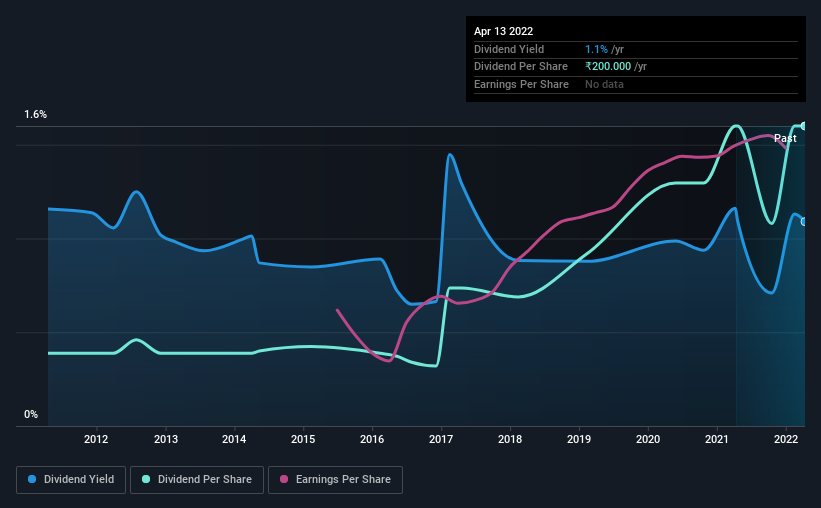Nestlé India (NSE:NESTLEIND) Is Due To Pay A Dividend Of ₹90.00

The board of Nestlé India Limited (NSE:NESTLEIND) has announced that it will pay a dividend of ₹90.00 per share on the 12th of May. Including this payment, the dividend yield on the stock will be 1.1%, which is a modest boost for shareholders' returns.
Check out our latest analysis for Nestlé India
Nestlé India Doesn't Earn Enough To Cover Its Payments
It would be nice for the yield to be higher, but we should also check if higher levels of dividend payment would be sustainable. Prior to this announcement, Nestlé India's dividend was making up a very large proportion of earnings and perhaps more concerning was that it was 125% of cash flows. Paying out such a high proportion of cash flows certainly exposes the company to cutting the dividend if cash flows were to reduce.
Over the next year, EPS could expand by 16.5% if the company continues along the path it has been on recently. If the dividend continues on its recent course, the payout ratio in 12 months could be 98%, which is a bit high and could start applying pressure to the balance sheet.

Dividend Volatility
The company's dividend history has been marked by instability, with at least 1 cut in the last 10 years. Since 2012, the dividend has gone from ₹48.50 to ₹200. This implies that the company grew its distributions at a yearly rate of about 15% over that duration. Despite the rapid growth in the dividend over the past number of years, we have seen the payments go down the past as well, so that makes us cautious.
Nestlé India Might Find It Hard To Grow Its Dividend
Given that the dividend has been cut in the past, we need to check if earnings are growing and if that might lead to stronger dividends in the future. We are encouraged to see that Nestlé India has grown earnings per share at 16% per year over the past five years. Past earnings growth has been decent, but unless this is one of those rare businesses that can grow without additional capital investment or marketing spend, we'd generally expect the higher payout ratio to limit its future growth prospects.
Nestlé India's Dividend Doesn't Look Sustainable
In summary, while it's good to see that the dividend hasn't been cut, we are a bit cautious about Nestlé India's payments, as there could be some issues with sustaining them into the future. While we generally think the level of distributions are a bit high, we wouldn't rule it out as becoming a good dividend payer in the future as its earnings are growing healthily. We don't think Nestlé India is a great stock to add to your portfolio if income is your focus.
Investors generally tend to favour companies with a consistent, stable dividend policy as opposed to those operating an irregular one. At the same time, there are other factors our readers should be conscious of before pouring capital into a stock. Taking the debate a bit further, we've identified 1 warning sign for Nestlé India that investors need to be conscious of moving forward. Looking for more high-yielding dividend ideas? Try our collection of strong dividend payers.
Valuation is complex, but we're here to simplify it.
Discover if Nestlé India might be undervalued or overvalued with our detailed analysis, featuring fair value estimates, potential risks, dividends, insider trades, and its financial condition.
Access Free AnalysisHave feedback on this article? Concerned about the content? Get in touch with us directly. Alternatively, email editorial-team (at) simplywallst.com.
This article by Simply Wall St is general in nature. We provide commentary based on historical data and analyst forecasts only using an unbiased methodology and our articles are not intended to be financial advice. It does not constitute a recommendation to buy or sell any stock, and does not take account of your objectives, or your financial situation. We aim to bring you long-term focused analysis driven by fundamental data. Note that our analysis may not factor in the latest price-sensitive company announcements or qualitative material. Simply Wall St has no position in any stocks mentioned.
About NSEI:NESTLEIND
Nestlé India
Manufactures and sells food products in India and internationally.
Adequate balance sheet average dividend payer.

